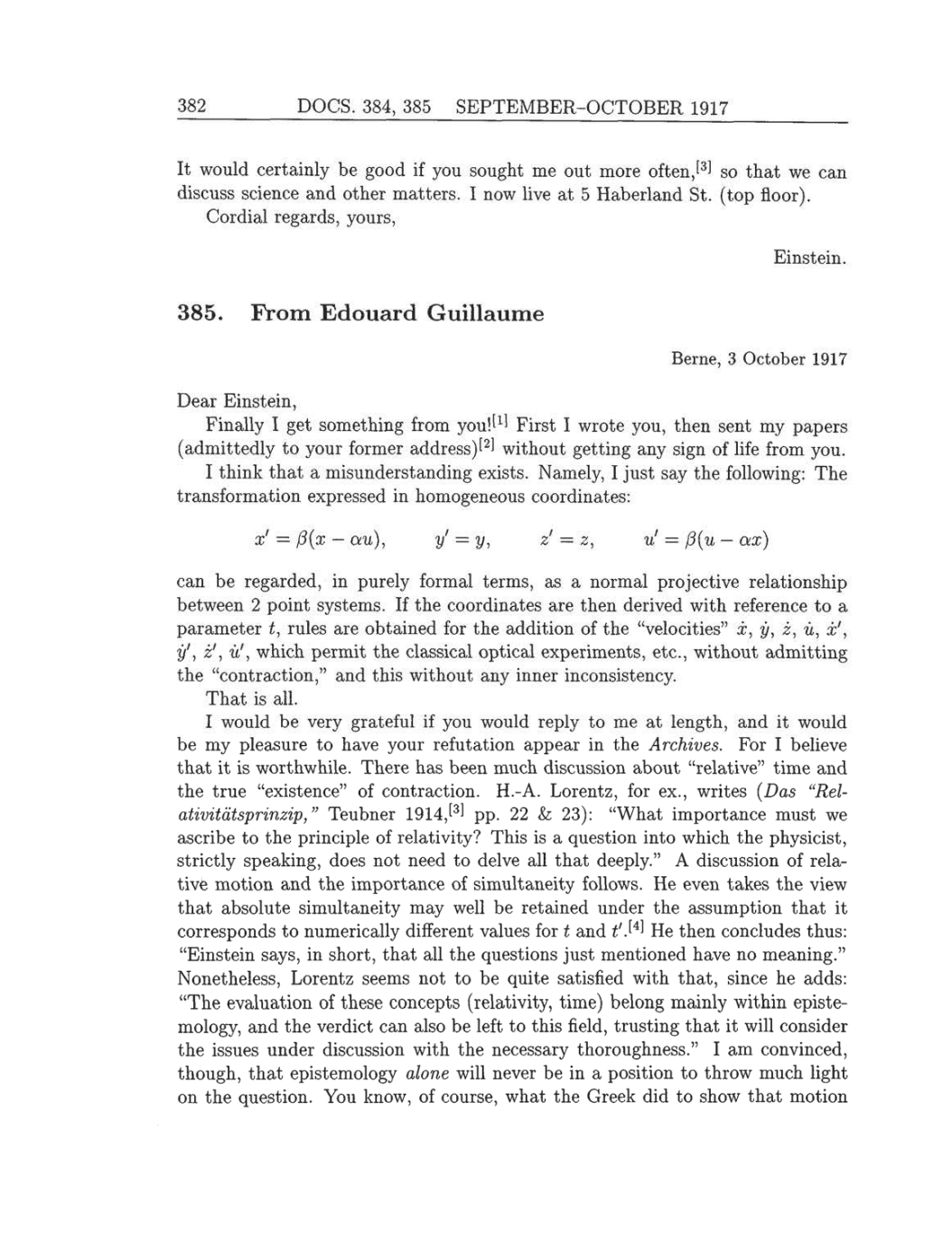382 DOCS.
384,
385
SEPTEMBER-OCTOBER
1917
It
would
certainly
be
good
if
you sought
me
out
more
often,[3] so
that
we can
discuss science and
other
matters.
I
now
live at
5
Haberland
St.
(top
floor).
Cordial
regards, yours,
Einstein.
385.
From Edouard Guillaume
Berne, 3
October
1917
Dear
Einstein,
Finally
I
get something
from
you![1]
First
I wrote
you,
then
sent
my papers
(admittedly to
your
former
address)[2]
without
getting any
sign
of
life from
you.
I
think that
a
misunderstanding
exists.
Namely,
I
just
say
the
following:
The
transformation
expressed
in
homogeneous
coordinates:
x'
=
ß(x
-
ctu),
y'
=
y,
z'
=
z,
u'
=
ß(u
-
ax)
can
be
regarded,
in
purely
formal
terms,
as a
normal
projective relationship
between
2
point
systems.
If
the
coordinates
are
then
derived with reference to
a
parameter
t,
rules
are
obtained
for the
addition
of
the
“velocities”
x, y,
z, u,
x',
y', z',
u',
which
permit
the
classical
optical experiments, etc.,
without
admitting
the
“contraction,”
and
this without
any
inner
inconsistency.
That
is all.
I
would be
very grateful
if
you
would
reply
to
me
at
length,
and it
would
be
my pleasure
to
have
your
refutation
appear
in
the
Archives.
For
I believe
that
it
is
worthwhile.
There
has been much discussion
about
“relative”
time and
the
true “existence”
of
contraction. H.-A.
Lorentz,
for
ex.,
writes
(Das
“Rel-
ativitätsprinzip,”
Teubner
1914,[3]
pp.
22
&
23):
“What
importance
must
we
ascribe
to
the
principle
of
relativity?
This
is
a
question
into which the
physicist,
strictly
speaking,
does not
need
to delve
all
that
deeply.”
A discussion of rela-
tive
motion
and
the
importance of
simultaneity follows.
He
even
takes
the
view
that absolute
simultaneity may
well
be
retained under the
assumption
that
it
corresponds
to
numerically
different values for t and
t'.[4]
He
then
concludes thus:
“Einstein
says,
in
short,
that
all
the
questions
just
mentioned have
no
meaning.”
Nonetheless,
Lorentz
seems
not to be
quite
satisfied
with
that, since he adds:
“The evaluation
of
these
concepts (relativity, time) belong mainly
within
episte-
mology,
and the
verdict
can
also be left to
this
field,
trusting
that
it
will consider
the
issues
under
discussion with
the
necessary thoroughness.”
I
am
convinced,
though,
that
epistemology
alone
will
never
be in
a
position
to throw much
light
on
the
question.
You
know,
of
course,
what the
Greek did
to
show
that
motion
